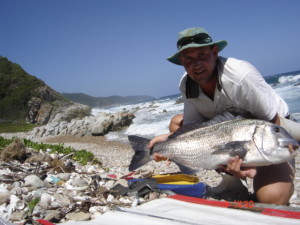In November 2015 the Minister of Environmental Affairs published the Draft Regulations for the Tsitsikamma National Park MPA, which among other things proposed the opening of four controlled zones in which Koukamma Municipality and Covie Community residents would be able to fish. This was not an attempt to allow access for small-scale or subsistence rights but purely for recreational fishing purposes. If these Regulations succeed, anglers would be able to catch, kill and keep fish from the oldest MPA in South Africa, which up until now has been a no-take MPA (the previously open section to the west of Storms River was closed to fishing almost 20 years ago).

Marine scientists across the board agree that this is a terrible mistake and many members of the public has voiced their concern as well. Decades of research in this and other MPAS (iSimangaliso, De Hoop and Pondoland) have shown that populations of resident fish species can be severely impacted in a short space of time at even low levels of fishing effort. The proposed access for an exclusive group of people only is also unconstitutional and cause for concern.
Over 700 hundred submissions have been made to the Minister, most of which are against the opening of the MPA to fishing. SACRAA submitted comments on the Draft Regulations to the Minister in December 2015. We eagerly await her response and hope that sanity will prevail over political expediency.
Unfortunately it seems sanity did not prevail over political expediency and the Minister published the Tsitsikamma MPA Declaration Notice and the accompanying Management Regulations on 19 December 2016. The Regulations remain largely unchanged from the Draft document published in December 2015 despite overwhelming opposition and evidence that allowing recreational angling by a select few community members would be detrimental to the objectives of the MPA, i.e. protection of threatened fish species. The only change is the removal of one of the proposed Controlled Zones where fishing was to be allowed – it was the smallest of the proposed zones and the most difficult to access. The net positive effect of this “compromise” is insignificant. The Friends of Tsitsikamma, comprising a group of marine scientists, will challenge the validity of this decision.
